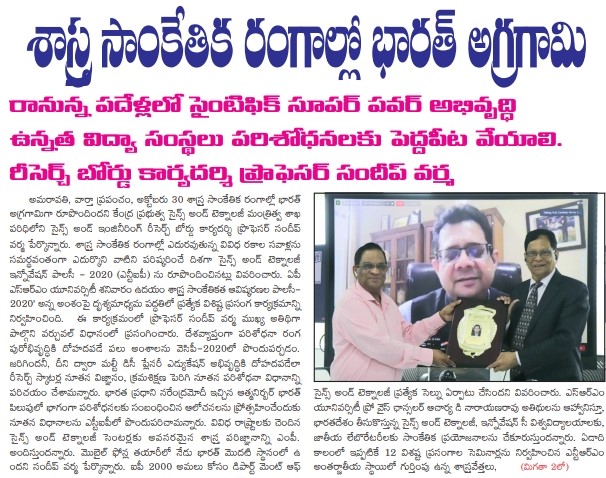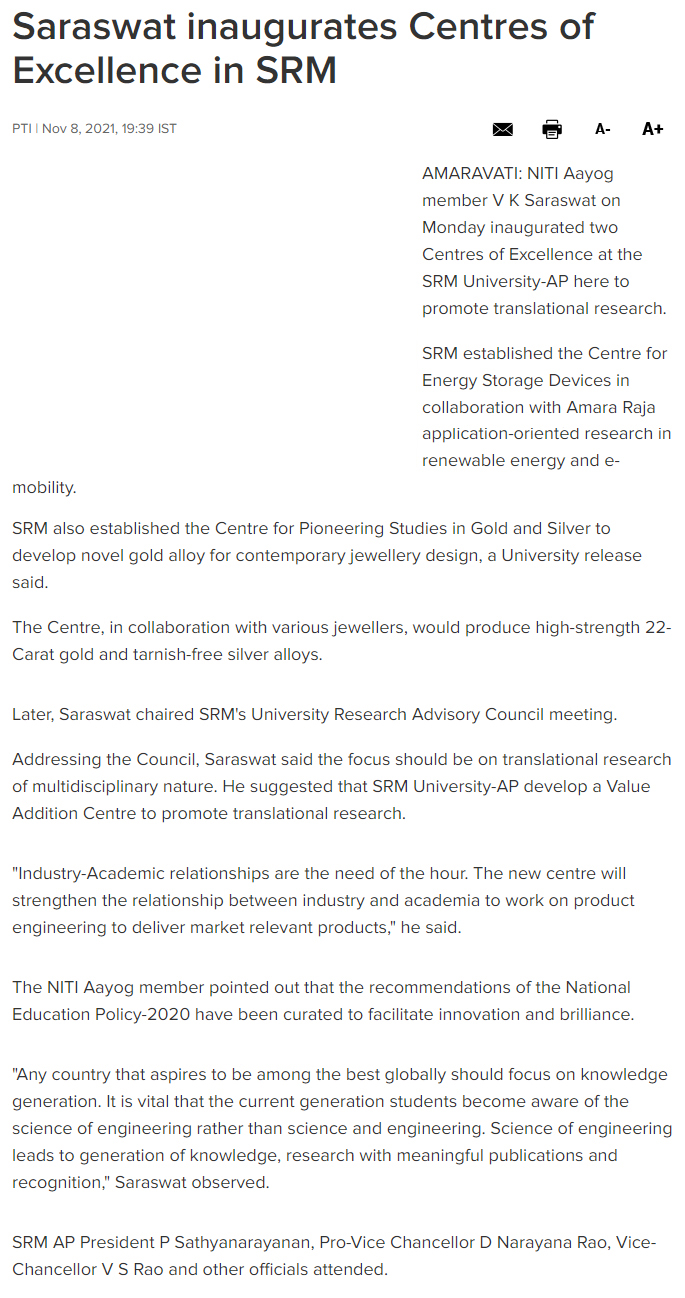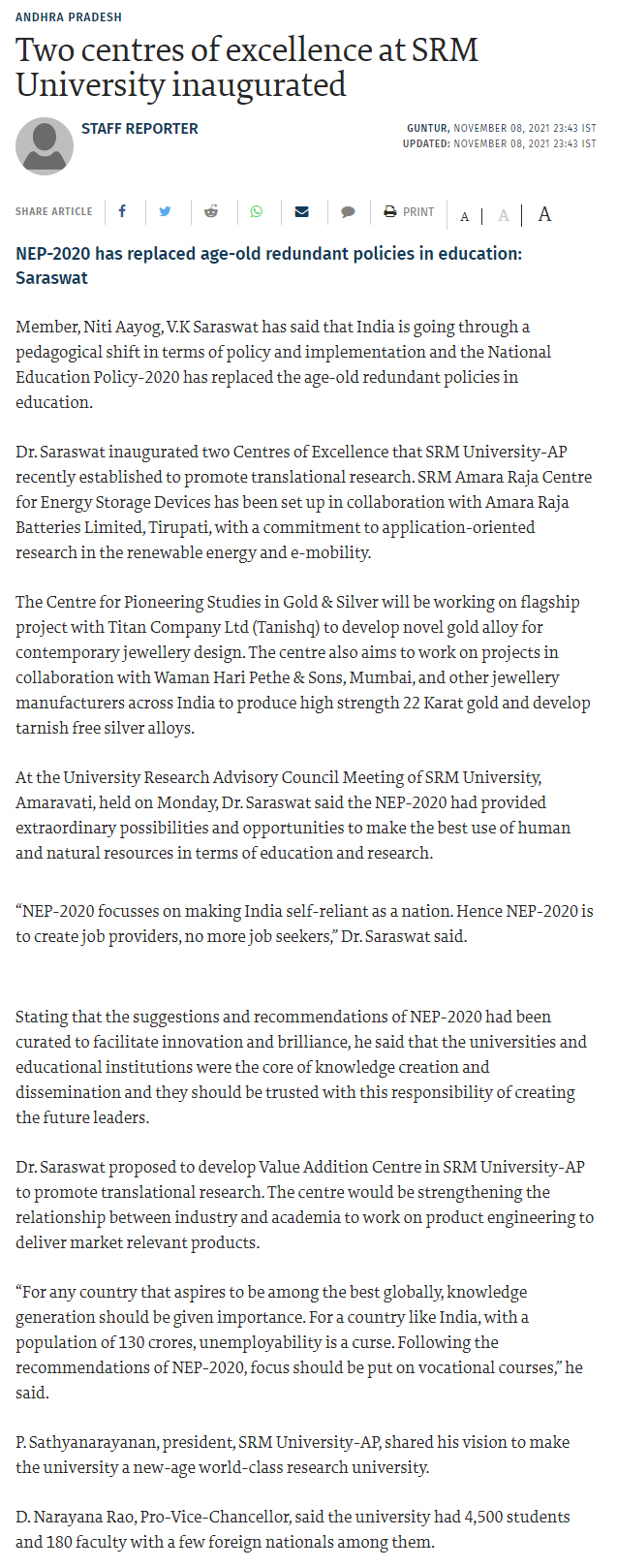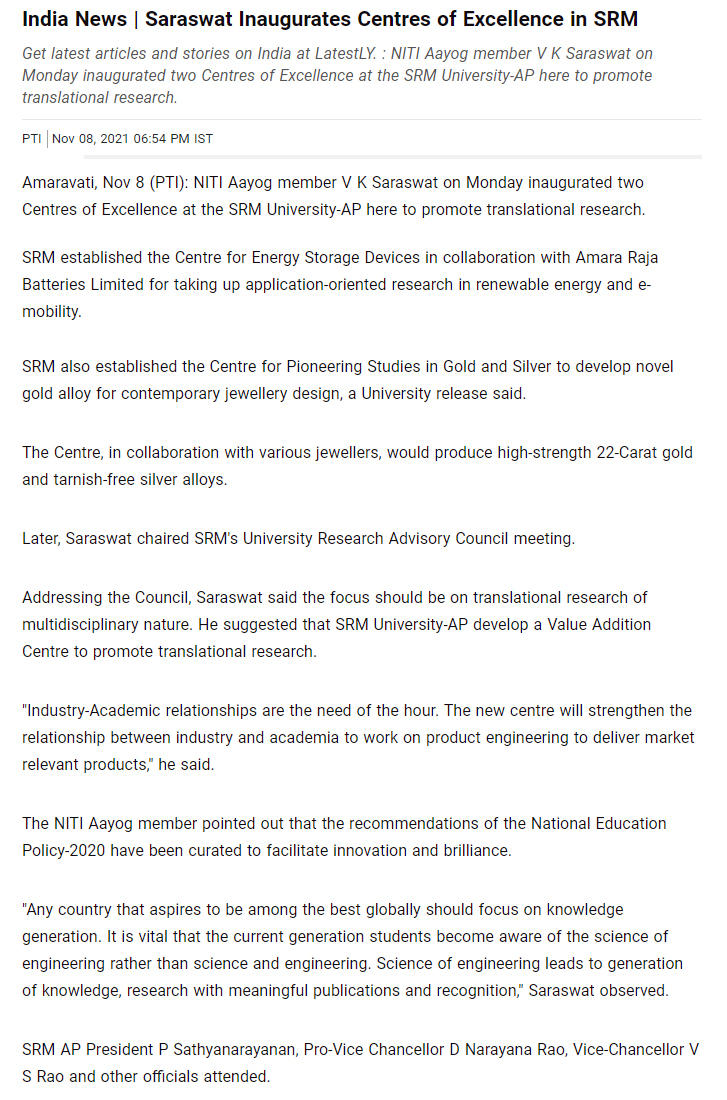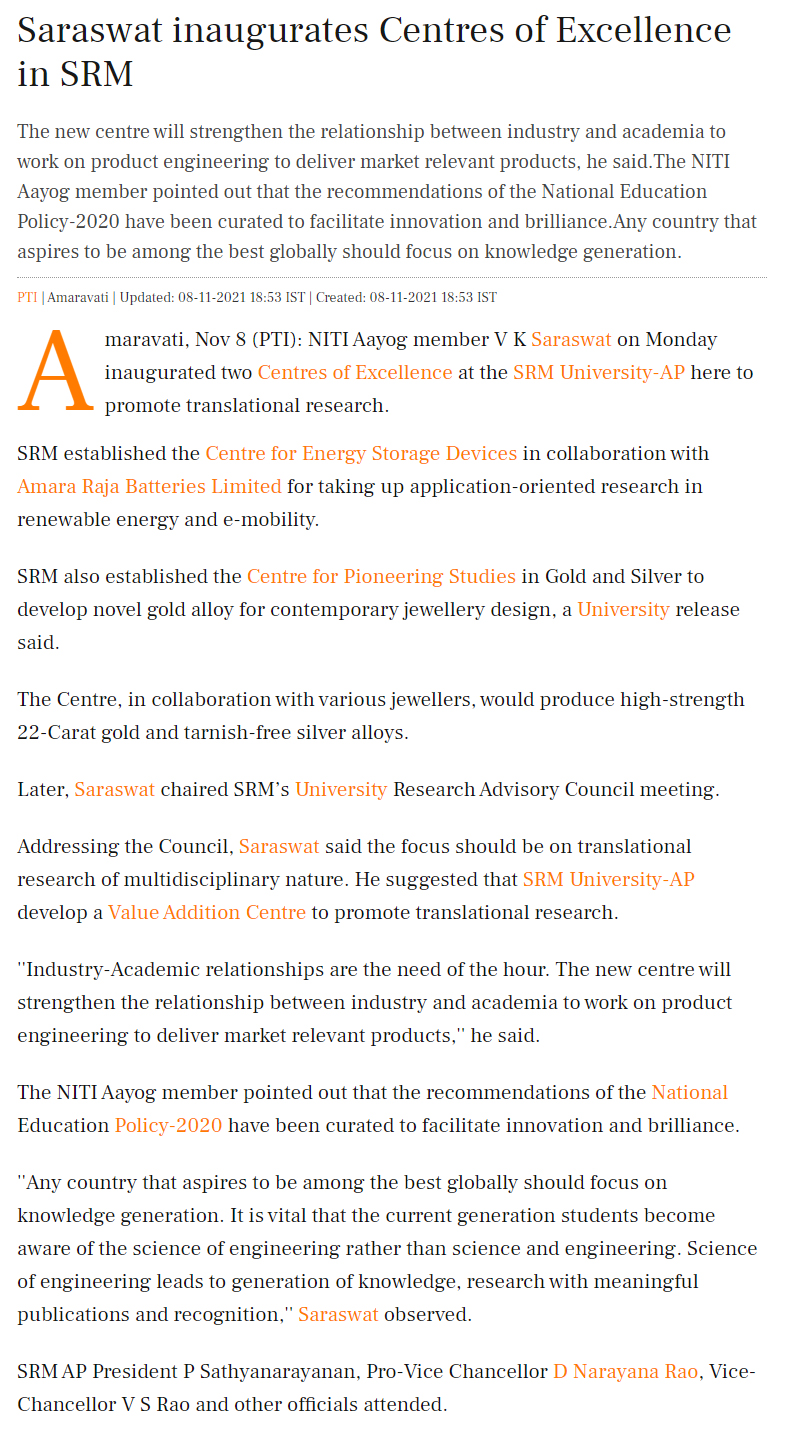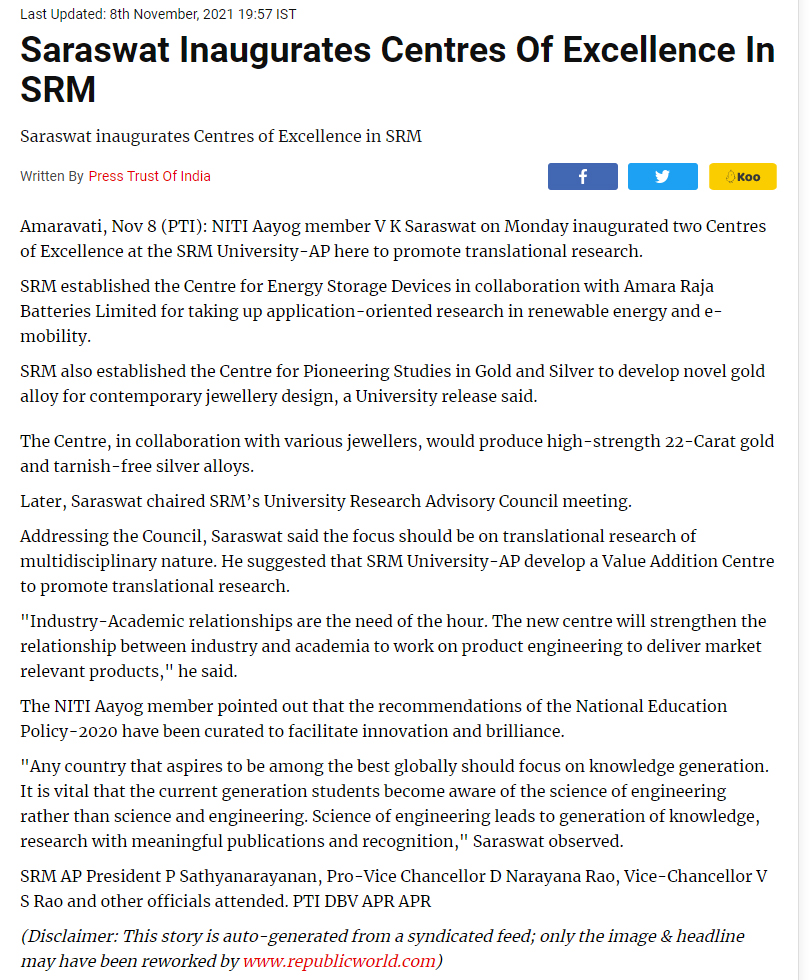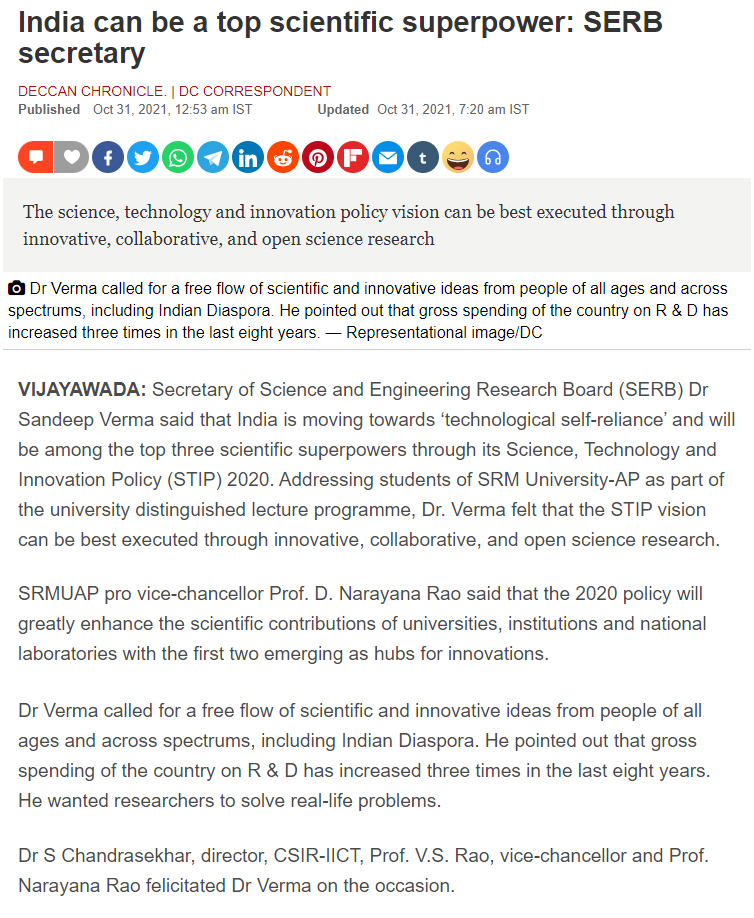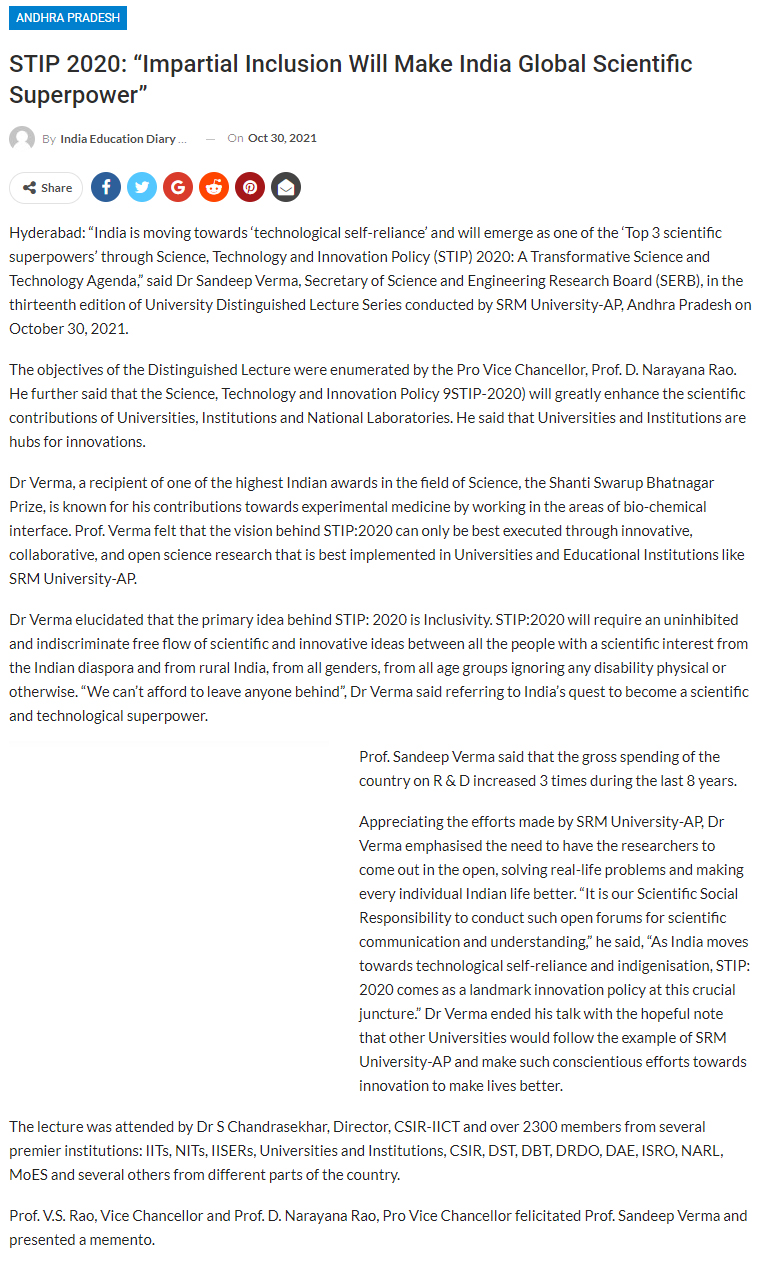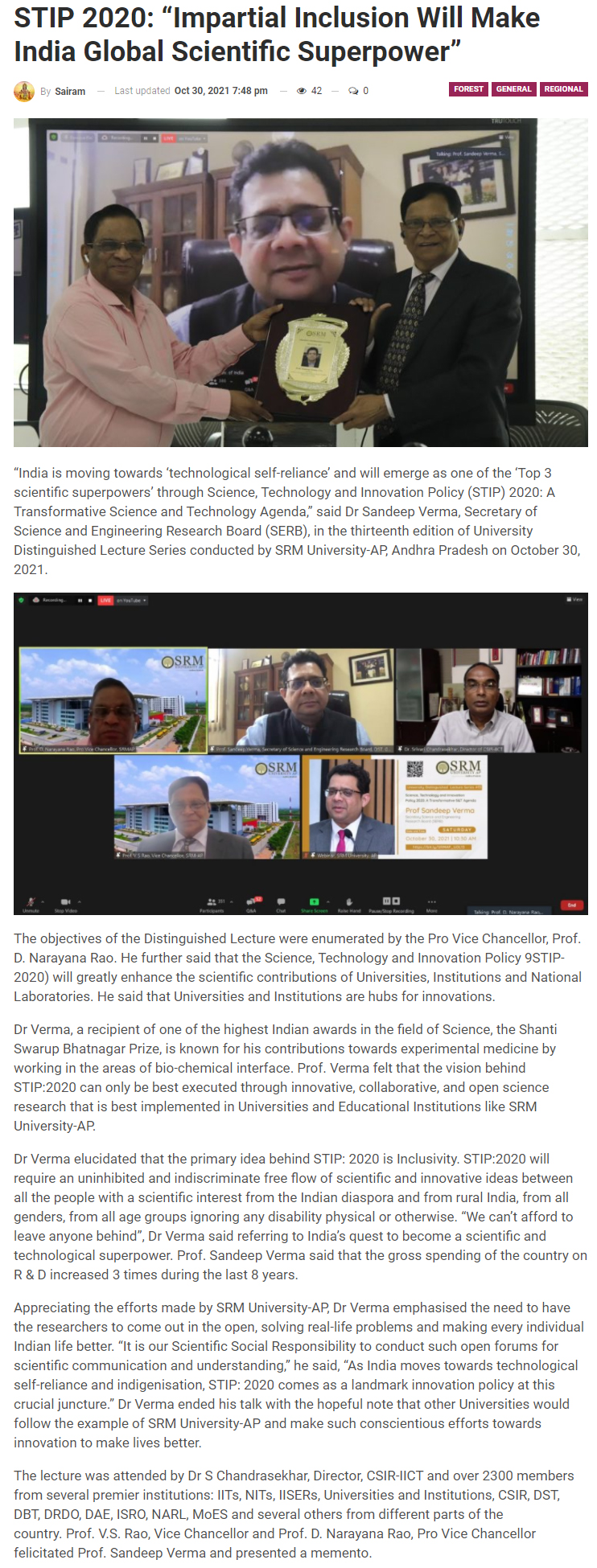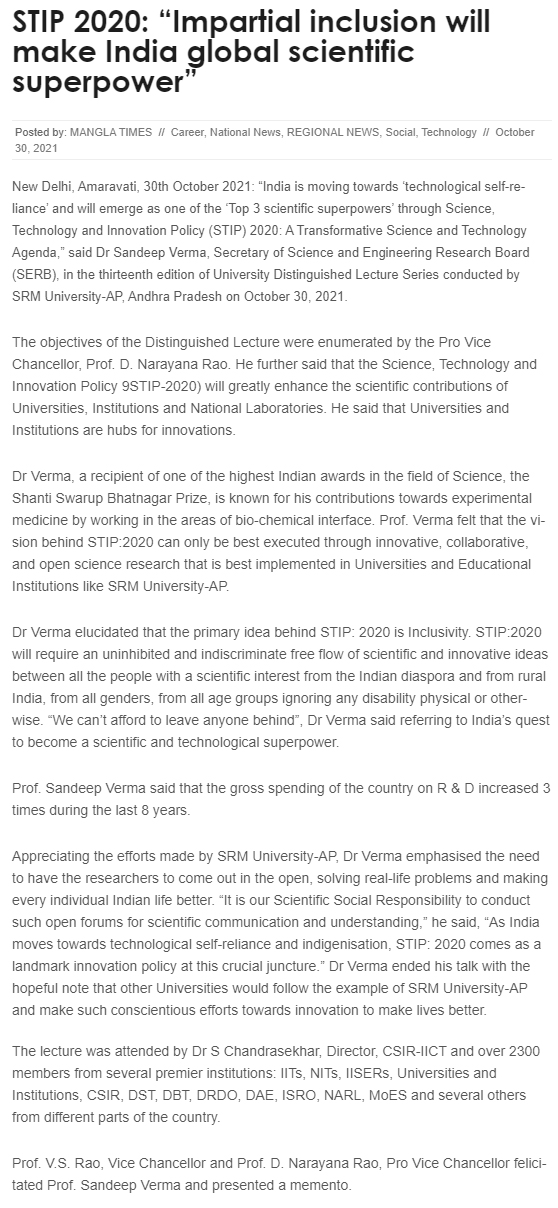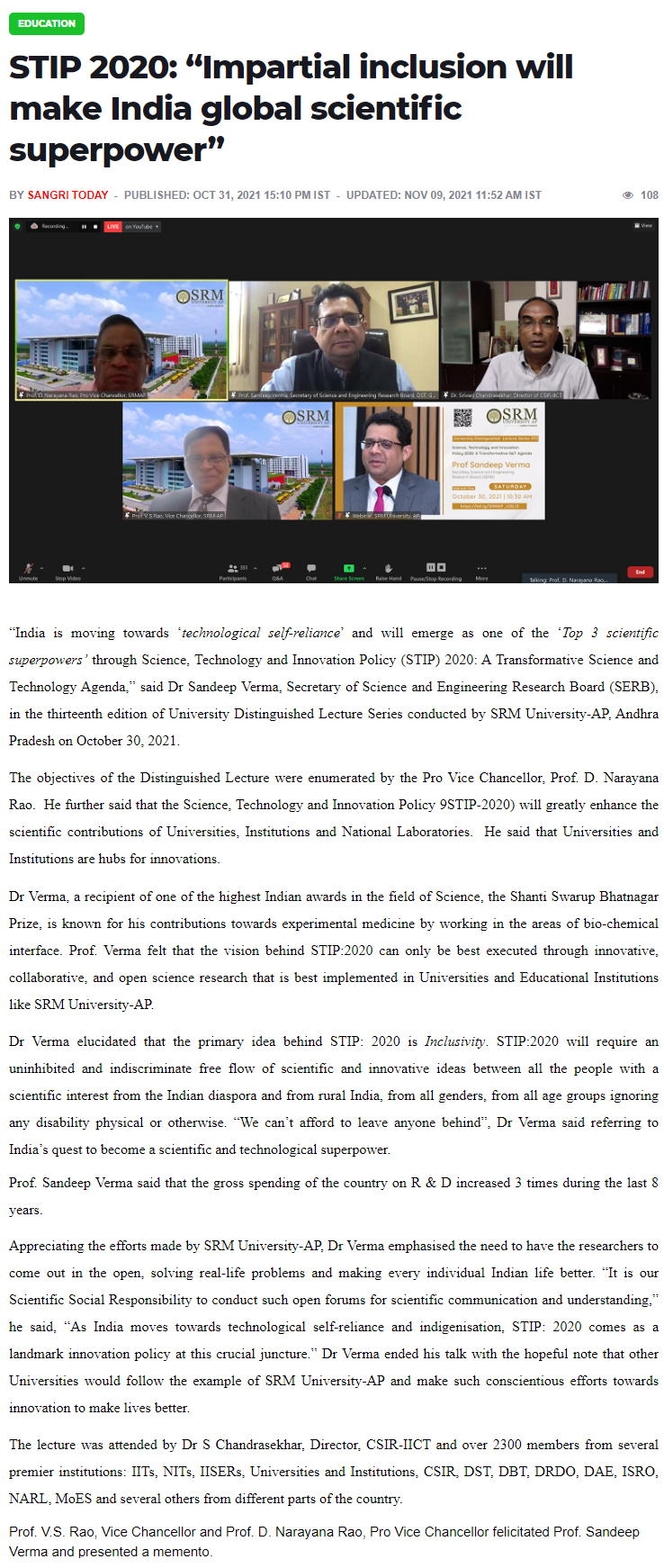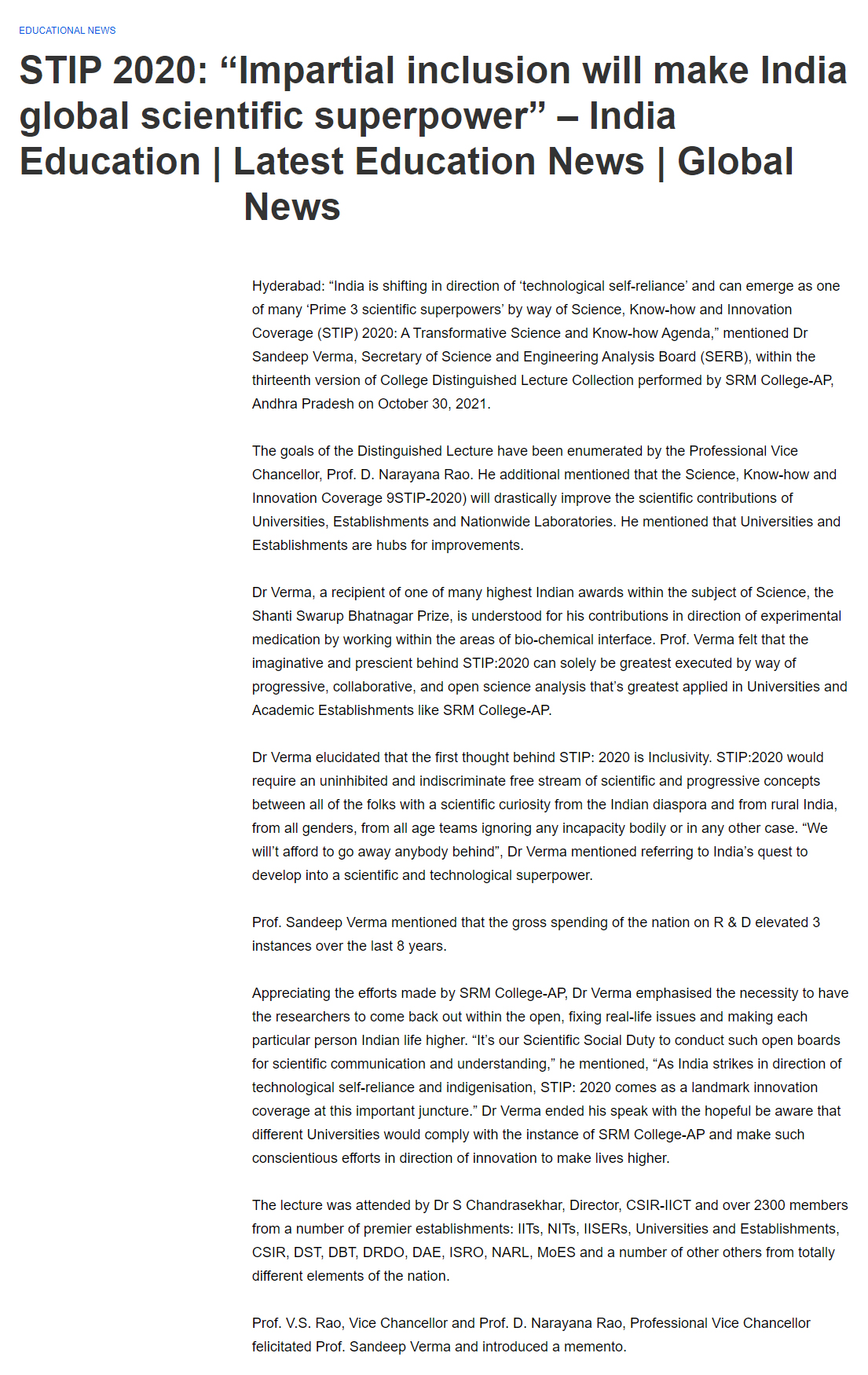All Management News
- Neuronal Calcium Signalling in Health and Disease: lessons from model organisms November 12, 2021
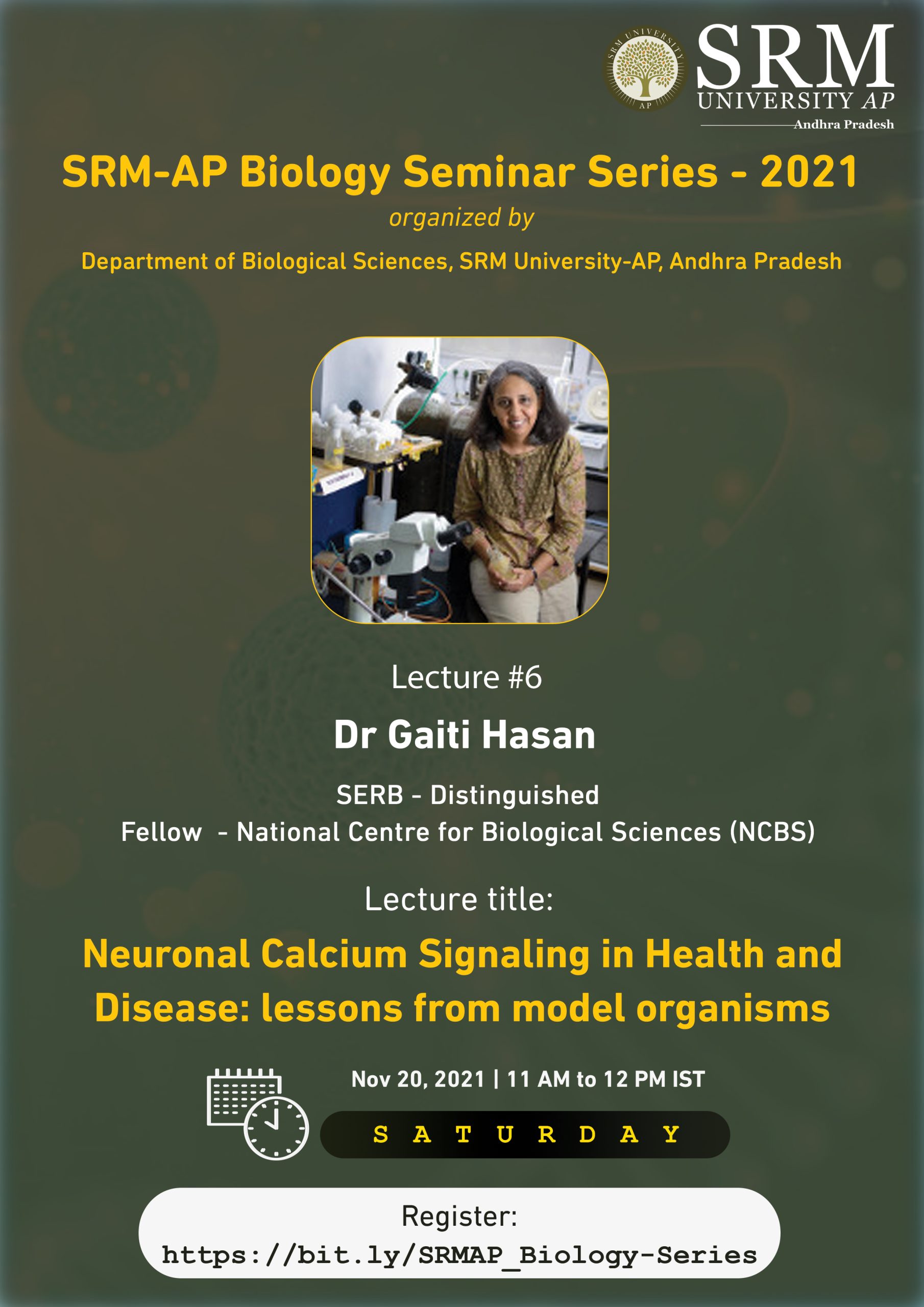 The Department of Biological Sciences at SRM University-AP welcomes Dr Gaiti Hasan, SERB-Distinguished fellow, for the next chapter of our Biology Seminar Series on November 20, 2021, Saturday at 11.00 am for a riveting talk about the vitality of Calcium as an intracellular messenger regulating several parallel processes, particularly aimed towards healthcare.
The Department of Biological Sciences at SRM University-AP welcomes Dr Gaiti Hasan, SERB-Distinguished fellow, for the next chapter of our Biology Seminar Series on November 20, 2021, Saturday at 11.00 am for a riveting talk about the vitality of Calcium as an intracellular messenger regulating several parallel processes, particularly aimed towards healthcare.About the Speaker:
Dr Gaiti Hasan is an eminent researcher with a keen interest in the fields of Neuroscience, neurodegeneration, InsP3 and calcium signalling in neuronal function, and molecular genetics. She joined National Centre of Biological Sciences (NCBS), Bangalore in 1992 and held various positions there, and, most recently, since 2019 she has carried on as a SERB-Distinguished Fellow. Dr Hasan is also a elected Fellow of the Indian National Science Academy (INSA), Indian Academy of Science, and World Academy of Sciences, and was elected as INSA’s Vice-President in 2020.
Dr Hasan obtained her doctorate (PhD) from the University of Cambridge, UK. She had completed her M. Phil in Life Sciences and Master of Science in Life Sciences at Jawaharlal Nehru University, and her Bachelor of Science in Zoology at Miranda House, University of Delhi.
She is a recipient of “Chaire Gutenberg” by Strasbourg Communities, Strasbourg, France in 2020 and Darshan Ranganathan INSA Award Lecture in 2019 for her prolific contributions to the development of the scientific field.
Dr Hasan has several Editorial Board Memberships notably in PLOS Genetics (Associate Editor), Current Science (Section Editor), Frontiers in Molecular Neuroscience (Associate Editor), and Journal of Neurogenetics.
Join us on November 20, 2021, Saturday at 11.00 am to hear one of the most gifted scientists of our country, Dr Gaiti Hasan, share her research insights.
Register Here
Continue reading → - Dr Rohit K Abhimalla November 12, 2021
- Recent Trends in Microwave and Beyond Techniques November 10, 2021
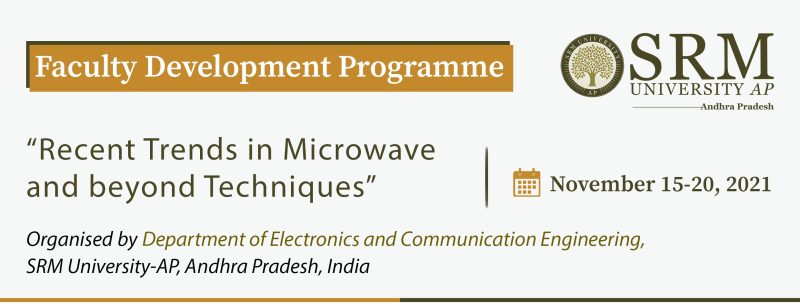 SRM University-AP, is pleased to announce that the Department of Electronics and Communications Engineering is bringing forth a Faculty Development Programme (FDP) on “Recent Trends in Microwave and Beyond Techniques”. The duration of the program duration is November 15, 2021 to November 20, 2021. The sessions are scheduled in the afternoon from 2:00 to 5:00 p.m., Tuesday to Friday and in Forenoon from 10:00 a.m. to 12:00 p.m. on Saturday.
SRM University-AP, is pleased to announce that the Department of Electronics and Communications Engineering is bringing forth a Faculty Development Programme (FDP) on “Recent Trends in Microwave and Beyond Techniques”. The duration of the program duration is November 15, 2021 to November 20, 2021. The sessions are scheduled in the afternoon from 2:00 to 5:00 p.m., Tuesday to Friday and in Forenoon from 10:00 a.m. to 12:00 p.m. on Saturday.This is a 6-day online Faculty Development Programme aimed to enhance research capabilities of the researchers and professionals working in RF/ Microwave, Millimetre Waves, 5G communication and Metamaterial domain. Eminent Scientists and professors from highly reputed institutes will share their research experience with budding researchers, and expert from industries will offers Hands on Sessions. This Program will be managed by the Faculties of Department of ECE, SRM-AP.
* There is no registration fee for this FDP program. The certificate will be provided to all the attendees of this program. The candidates can register for this program on the link given below.
Register here.
The programme will cover a wide range of topics such as
- Space exploration and technical challenges in Mars Landing
- High-performance Microwave and Millimetre Wave Components Utilizing Suspended Substrate Transmission Line
- Metamaterials
- RF Energy Harvesting
- Microwave Amplifiers/Microwave absorbers
- 5G Beam forming Techniques/5G Antenna Implementation and challenges
- Characteristic Mode Approach to Antenna and Array analysis
- FSS for Aerospace applications: radome and antenna
- Dielectric Resonator Antennas for Futuristic Applications
- Near and Far-Field Wireless Power Transfer: Trends, Techniques and Recent Developments
Some of the eminent speakers in this program will be
- Dr Goutam Chattopadhyay (NASA-Jet Propulsion Laboratory, California Institute of Technology)
- Prof. S.K. Koul (CARE, IIT Delhi)
- Dr Arokiaswami Alphones (School of Electrical and Electronic Engineering, NTU Singapore)
- Prof. V. Subramanian (Dept. of Physics, IIT Madras)
- Dr Mrinal Kanti Mandal (IIT Kharagpur)
- Dr Chinmoy Saha (Dept. of Space, IIST Thiruvananthapuram)
- Dr Arani Ali Khan (Dept. of Electrical Engg., IIT Jodhpur)
- Dr Debdeep Sarkar (Dept. of Electrical Commu., IISC Banglore)
- Dr Saptrishi Ghosh (Dept. of Electrical Engg., IIT Indore)
- Dr Shiv Narayan (NAL Banglore)
- Mr Sandeep Ghoshal (Maths work)
- Dr Ravi Dutt Gupta (Ace Technologies)
- Swapnil Gaul (Founder – NUMEREGION)
- Sumith S. Pillai (EMAG Solution Engineer, CST Microwave studio, VIAS pvt. ltd.)
This programme is being conducted under the watchful and dedicated eyes of Dr Divya Chaturvedi, Dr Goutam Rana, and Dr Ramesh Vaddi, from the Department of Electronics and Communications Engineering.
We invite faculty members from Indian and International institutes, research scholars, undergraduate and post-graduate students to become a part of an interesting and illuminating session which will have speakers from various teaching and professional fields to contribute their theoretical and practical insights.
This program will be especially helpful to the participants who are doing or planning to start research career in RF/Microwave-Millimetre wave domains. The recordings of the sessions will be provided to all attendees. The certificate of participation will also be provided to all the participants.
Register here.
Continue reading → - Stabilizing Li-S batteries: energy storage solution for the future November 10, 2021
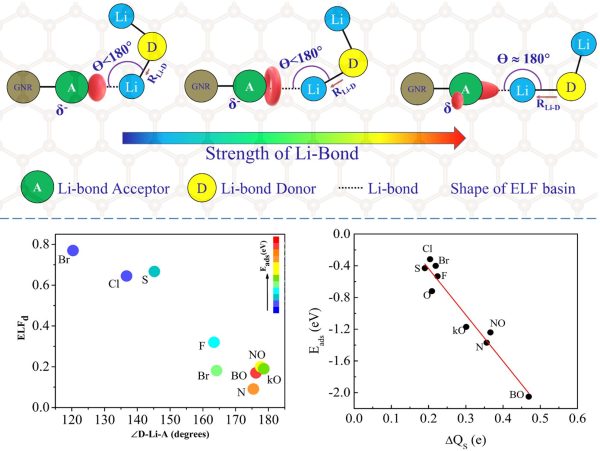 As technology gets revolutionized, we face the need to have more- more efficient energy storage solutions with decreased strain on the environment to meet our need. SRM University-AP happy to let everyone know that our Dr Ranjit Thapa, Professor of Physics along with his PhD scholar, Mr Deepak S Gavali has published a paper titled, “Understanding the role of lithium bonds in doped graphene nanoribbons as cathode hosts for Li-S batteries: A first-principles study” in ‘International Journal of Energy Research’, having an Impact Factor of 5.164.
As technology gets revolutionized, we face the need to have more- more efficient energy storage solutions with decreased strain on the environment to meet our need. SRM University-AP happy to let everyone know that our Dr Ranjit Thapa, Professor of Physics along with his PhD scholar, Mr Deepak S Gavali has published a paper titled, “Understanding the role of lithium bonds in doped graphene nanoribbons as cathode hosts for Li-S batteries: A first-principles study” in ‘International Journal of Energy Research’, having an Impact Factor of 5.164.About the Research:
Lithium sulphur (Li-S) batteries hold immense potential as energy storage devices of the future because of their high energy density (2600 Wh kg −1), lower cost and non-toxic nature as compared to the currently available lithium-ion batteries. However, the commercialization of Li-S batteries is hindered due to a number of challenges that include the polysulfide shuttle effect, viz, the dissolution of lithium polysulfide species (LiPS) in the cathode into the electrolyte and its diffusion to the anode and back. The shuttle effect results in poor Coulombic efficiency, low utilization of active materials, and degradation of electrode. Moreover, the insulating nature of the sulphur cathode is a key contributor to its low specific capacity. One way to circumvent these problems is by employing conducting cathode hosts as additives that would act as trapping agents for the LiPS, preventing their migration to the anode.
“Using first-principles calculations, we investigate a family of doped graphene nanoribbons (GNRs) for their suitability as cathode hosts in Lithium sulphur batteries. We probe the role played by the lone pairs of the dopants in confining the Lithium polysulfides (LiPS) in order to understand the mechanism of binding. Our results show that the Li-bond between the polysulfides and the doped GNRs is analogous to a hydrogen bond and also dipole-dipole interactions play a key role in anchoring the polysulfides. The charge lost by the sulphur atom of the polysulfide upon adsorption and shape of the lone pair basins and the value of ELF at the dopant position can provide a quick estimate of the strength of the bond. Significant contractions in the ELF profiles are also observed upon Li 2 S adsorption, further providing evidence for the H bond like nature of the Li-bond. Our results corroborate the fact that all acceptors suitable for hydrogen bond can be employed as suitable dopants for carbon-based cathode hosts in Li-S batteries.”
Dr Thapa and his PhD scholar conducted this research in collaboration with a Department of Physics and Research Centre, Lady Doak College, Madurai, 625002, Tamil Nadu, India. For their future research they are also working in the field of Li-ion battery. They are searching for new carbon allotrope structure which should have the ability to enhance the specific capacity and reduce the volume expansions as compared to the commercialized anode material.
Continue reading → - Assessment of corporate bodies in the light of corporate governance rating November 10, 2021
 Assessing the grading and rating system in any corporation is important for the management and the stakeholders, and the more efficient they are the easier it becomes to plan future trajectories. SRM University-AP is happy to announce that Dr Lakshman Rao Ayyagari, Assistant Professor of Commerce has researched extensively on this issue and published a paper titled, “The ignored tool “corporate governance rating”: An overview of the corporate world in the emerging market” in “Journal of Governance and Regulation.
Assessing the grading and rating system in any corporation is important for the management and the stakeholders, and the more efficient they are the easier it becomes to plan future trajectories. SRM University-AP is happy to announce that Dr Lakshman Rao Ayyagari, Assistant Professor of Commerce has researched extensively on this issue and published a paper titled, “The ignored tool “corporate governance rating”: An overview of the corporate world in the emerging market” in “Journal of Governance and Regulation.According to Dr Ayyagari, this research work is like a grading pattern, we adopt to rate and rank various organizations on various parameters, accordingly “Corporate Governance Rating” is a tool to assess firms’ performance, but not widely used in assessment, recommended for its use, keeping in mind the interests of various stakeholders.
About the research:
The interest of the Stakeholders is to see the growth of their entities, also they benchmark their entities through business performance metrics or tools like Return on Equity, Return on Assets, Earnings Per Share, Gross Profit Margin, Employee Productivity, Sales Turnover, ratings given by prominent credit rating agencies such as ICRA, CRISIL, Standard and Poor etc. In addition to this, internal governance mechanisms, board of directors’ characteristics, their independence, transparency, concentration, and presence of employees in the ownership structure also influence financial and stock market performance. However, assessing the performance of entities through some of these limited angles is not always possible. One more criterion for assessing the performance of entities is “Corporate Governance Rating”. However, it is not widely used as a tool to assess a firm’s performance in the emerging markets. The present research paper is intended to address the scenario of Corporate Governance Rating in the Corporate World to assess a firm’s performance. With the help of majorly secondary sources of data conducted a study from 2003 to 2021 based on the CRISIL’s rating pattern. The findings showed the significance of Corporate Governance Rating for its adoption and future research in the development of rating mechanisms in India as well as in emerging markets.
This research can be recommended to regulatory bodies especially in India like SEBI for conducting thorough research in this area for a policy study and implementation.
Continue reading → - Dr Satheesh Ellipilli joins us as a Ramanujan Fellowship Faculty November 10, 2021
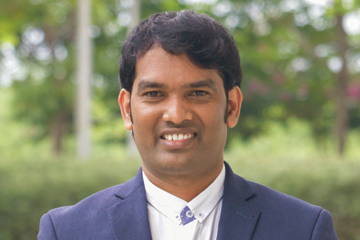 SRM University-AP is honoured to host Dr Satheesh Ellipilli as a DST- Ramanujan Fellowship Faculty and facilitate his research for the next five years.
SRM University-AP is honoured to host Dr Satheesh Ellipilli as a DST- Ramanujan Fellowship Faculty and facilitate his research for the next five years.Ramanujan Fellowship is one of the most prestigious scientific fellowships that is offered to the Indian scientists working abroad. This fellowship is offered by Science and Engineering Research Board (SERB) to encourage scientists of Indian origin to return and research in an Indian institute/University.
SERB offers the scientists Rs 1,35,000/- per month along with research grant of Rs 7,00,000/- per annum and Rs 60,000/- per annum for overhead charges.
Dr. Satheesh Ellipilli obtained his PhD from Indian Institute of Science Education and Research, Pune. He worked as a postdoctoral researcher in The Ohio State University (Columbus, USA), Emory University (Atlanta, USA), and The University of Utah (Salt Lake City, USA).
Dr. Satheesh Ellipilli has extensive experience in the field of nucleic acid chemistry, particularly, focusing on utilization of RNA nanotechnology for cancer therapy using RNAi therapeutics in combination with small molecule drugs.
He has made numerous publications in some of the most renowned journals like Journal of Organic Chemistry, Journal of Controlled Release, Chemical Communications, Bioconjugate Chemistry, Organic and Biomolecular Chemistry, and Chemical Review to name a few.
Having Dr Ellipilli with us for the duration of his fellowship is a golden learning opportunity and a pleasure to be the host institution for his work. We hope that our students and scholars develop stronger research ethics and acumen in his company.
Continue reading → - Design and implementation of frequency controller for wind energy-based hybrid power system November 10, 2021
 Dr Tarkeshwar Mahto, Assistant Professor, in the Department of Electrical and Electronics Engineering has published a paper titled “Design and Implementation of Frequency Controller for Wind Energy-Based Hybrid Power System Using Quasi-Oppositional Harmonic Search Algorithm” in the reputed research journal, Energies.
Dr Tarkeshwar Mahto, Assistant Professor, in the Department of Electrical and Electronics Engineering has published a paper titled “Design and Implementation of Frequency Controller for Wind Energy-Based Hybrid Power System Using Quasi-Oppositional Harmonic Search Algorithm” in the reputed research journal, Energies.An innovative union of fuzzy controller and proportional-integral-derivative (PID) controller under the environment of fractional order (FO) calculus is described in the present study for an isolated hybrid power system (IHPS) in the context of load frequency control. The proposed controller is designated as FO-fuzzy PID (FO-F-PID) controller. The undertaken model of IHPS presented here involves different independent power-producing units, a wind energy-based generator, a diesel engine-based generator and a device for energy storage (such as a superconducting magnetic energy storage system). The selection of the system and controller gains was achieved through a unique quasi-oppositional harmony search (QOHS) algorithm. The QOHS algorithm is based on the basic harmony search (HS) algorithm, in which the combined concept of quasi-opposition initialization and HS algorithm fastens the profile of convergence for the algorithm. The competency and potency of the intended FO-F-PID controller were verified by comparing its performance with three different controllers (integer-order (IO)-fuzzy-PID (IO-F-PID) controller, FO-PID and IO-PID controller) in terms of deviation in frequency and power under distinct perturbations in load demand conditions. The obtained simulation results validate the cutting-edge functioning of the projected FO-F-PID controller over the IO-F-PID, FO-PID and IO-PID controllers under non-linear and linear functioning conditions. In addition, the intended FO-F-PID controller, considered a hybrid model, proved to be more robust against the mismatches in loading and the non-linearity in the form of rate constraint under the deviation in frequency and power front.
The research group believes that the study will boost the use of renewable energy utilization for fulfilling energy requirements in a more reliable and stable manner. In future, they plan to use the knowledge gained from the isolated systems to develop a Multi-Migrigrid system.
Collaborations:
- Department of Electrical and Electronics Engineering, M S Ramaiah Institute of Technology, Bengaluru 560054, India
- The Berkeley Education Alliance for Research in Singapore, The National University of Singapore, Singapore 138602, Singapore
- Clean and Resilient Energy Systems (CARES) Lab, Texas A&M University, Galveston, TX 77553, USA;
- Department of Electrical Engineering, College of Engineering, Taif University, Taif 21944, Saudi Arabia
- Dr VK Saraswat inaugurated Centres of Excellence to promote translational research November 9, 2021
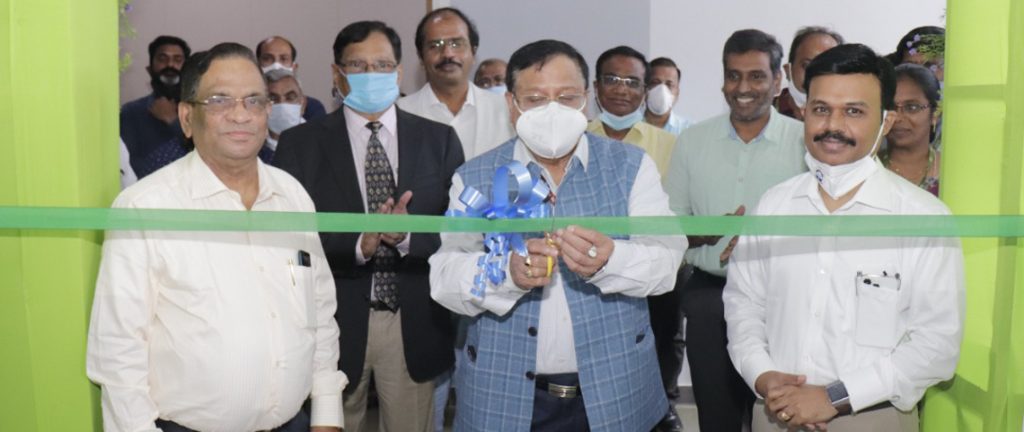 SRM University-AP organised its University Research Advisory Council Meeting on Monday, November 08, 2021. Dr V K Saraswat, Hon’ble Member, NITI AAYOG, chaired the meeting as the Chairman of the Council. Dr P Sathyanarayanan, President, SRM University-AP, Prof VS Rao, Vice-Chancellor, SRM University-AP, Prof D Narayana Rao, Pro-Vice-Chancellor, SRM University-AP, Dr Vinayak Kalluri, Registrar-in-Charge were among other dignitaries.
SRM University-AP organised its University Research Advisory Council Meeting on Monday, November 08, 2021. Dr V K Saraswat, Hon’ble Member, NITI AAYOG, chaired the meeting as the Chairman of the Council. Dr P Sathyanarayanan, President, SRM University-AP, Prof VS Rao, Vice-Chancellor, SRM University-AP, Prof D Narayana Rao, Pro-Vice-Chancellor, SRM University-AP, Dr Vinayak Kalluri, Registrar-in-Charge were among other dignitaries.In his keynote speech, Dr V K Saraswat congratulated SRM University-AP for their remarkable progress as a university in the past two years. As a nascent university, SRMAP has already made its reputation as a progressive research university of the new era with numerous laurels to its credit. “India is going through a pedagogical shift in terms of policy and implementation. National Education Policy-2020 has sagaciously replaced the age-old redundant policy of 1968. It feels wonderful to note that SRM University-AP is already following NEP-2020 and its recommendations. NEP-2020 has provided extraordinary possibilities and opportunities to make the best use of human and natural resources in terms of education and research. NEP-2020 focuses on making India self-reliant as a nation. Hence NEP-2020 is to create job providers, no more job seekers”, said Dr Saraswat.
The suggestions and recommendations of NEP-2020 are curated to facilitate innovation and brilliance. The universities and educational institutions that are the cores of knowledge creation and dissemination are trusted with this responsibility of creating the leaders of tomorrow. In the twenty-first century, the focus should be on translational research of multidisciplinary nature. Industry-Academic relationships are needs of the hour. Dr Saraswat further proposed to develop Value Addition Centre in SRM University-AP to promote translational research. The centre will be strengthening the relationship between Industry and Academia to work on product engineering to deliver market relevant products. “Upscaling and upskilling are substantial in product engineering. We should further be focused on linking our curriculum to India’s glorious heritage. Our ancestors made tremendous progress in science, medicine, astrology, astronomy and other branches that the outside world knows very little about. It is now time to remember them and learn from them,” opined Dr Saraswat.
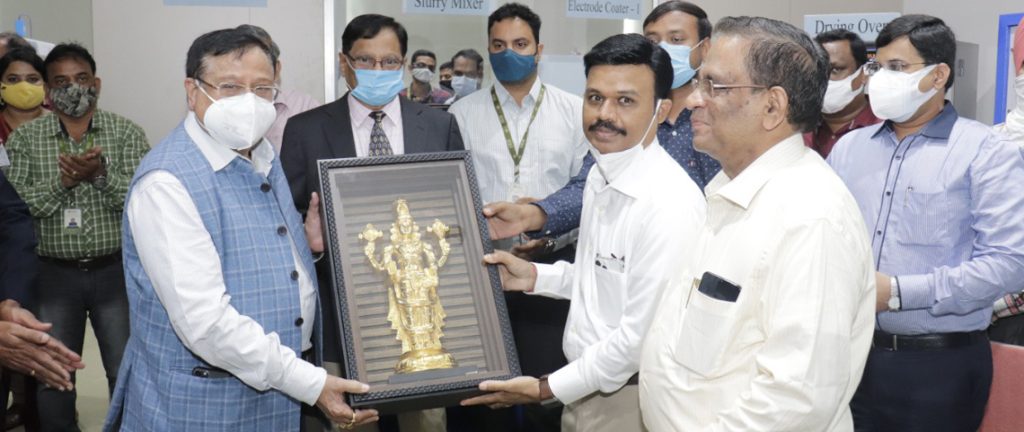 For any country that aspires to be among the best globally, knowledge generation should be given importance. For a country like India, with a population of 130 crores, unemployability is a curse. Following the recommendations of NEP-2020, focus should be put on Vocational Courses. It is vital that the students of this generation are aware of the science of engineering rather than science and engineering. Science of Engineering leads to the generation of knowledge, research with meaningful publications and recognition. Dr Saraswat further pointed out that liberal arts are an essential factor for holistic personality development in students.
For any country that aspires to be among the best globally, knowledge generation should be given importance. For a country like India, with a population of 130 crores, unemployability is a curse. Following the recommendations of NEP-2020, focus should be put on Vocational Courses. It is vital that the students of this generation are aware of the science of engineering rather than science and engineering. Science of Engineering leads to the generation of knowledge, research with meaningful publications and recognition. Dr Saraswat further pointed out that liberal arts are an essential factor for holistic personality development in students.India has an ambitious plan to make the country carbon neutral by the year 2070. Thus, encouragement is given on environment-friendly research. Thrust is given on the green environment, energy efficiency, alternate and unconventional sources of energy, use of renewable resources and recycle of industrial waste among others. Research should be cost-effective and environment friendly. The focus should be on reducing the carbon footprint in nature with proper planning on the use-storage and distribution of hydrogen in nature. India produces many academicians, scientists and engineers every year, but today India is more about theoretical research. It is now time not only to write papers but also to produce designs that are market relevant. SRMAP should take the initiative in this regard to deliver India able designer-engineers.
Dr V K Saraswat inaugurated two Centres of Excellence that SRM University-AP has recently established to promote translational research. SRM Amara Raja Centre for Energy Storage Devices is set up, in collaboration with Amara Raja Batteries Limited- Tirupati, with a commitment to application-oriented research in the renewable energy and e-mobility. Centre for pioneering studies in Gold & Silver will be working on flagship project with Titan Company Ltd (TANISHQ) to develop novel gold alloy for contemporary jewellery design. The centre also aims to work on projects in collaboration with Waman Hari Pethe & Sons, Mumbai and other jewellery manufacturers across India to produce high strength 22 Karat gold and develop tarnish free silver alloys.
Dr P Sathyanarayanan, President, SRM University-AP, shared his vision to make SRM University-AP as a new-age world-class research university. He agreed with Dr Saraswat and asserted that the management of SRMAP is ready to provide every help needed. “SRMAP encourages deep industry engagements, entrepreneurship along with technological education and advancement. To provide holistic education to students, SRMAP provides a strong emphasis on liberal arts,” said Dr Sathyanarayanan. Prof VS Rao, Vice-Chancellor, SRM University-AP, further elaborated on the extensive plan that SRMAP has to build a world-class university in the heart of Andhra Pradesh. The university has collaborative lineage with reputed names in education to provide best education to the students.
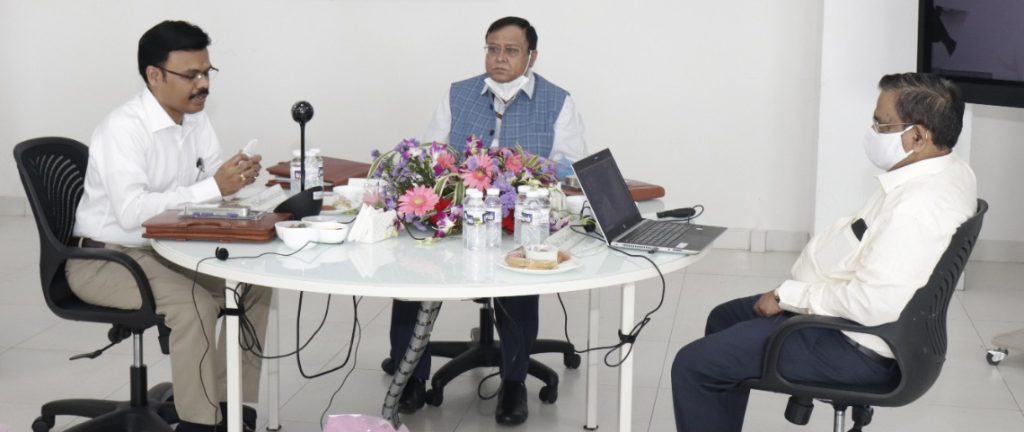 Prof D Narayana Rao, Pro-Vice-Chancellor, presented an overall roadmap of SRMAP’s progress in research so far and the way forward. The nascent university proudly houses 4500 students and 180 faculty with a few foreign nationals among them. Several DST- Inspire, DBT-Wellcome, Ramalingaswami and Ramanujan faculty are crowning the university with their exceptional research and teaching abilities. Stanford Research recognises the faculty of SRM University-AP among the world’s top 2% researchers. The university has published 678 papers in Scopus Indexed journals. The faculty are working on 38 projects with an outlay of 19.17 crores funded by the Government of India and Industry Giants.
Prof D Narayana Rao, Pro-Vice-Chancellor, presented an overall roadmap of SRMAP’s progress in research so far and the way forward. The nascent university proudly houses 4500 students and 180 faculty with a few foreign nationals among them. Several DST- Inspire, DBT-Wellcome, Ramalingaswami and Ramanujan faculty are crowning the university with their exceptional research and teaching abilities. Stanford Research recognises the faculty of SRM University-AP among the world’s top 2% researchers. The university has published 678 papers in Scopus Indexed journals. The faculty are working on 38 projects with an outlay of 19.17 crores funded by the Government of India and Industry Giants.The committee agreed that fundamental areas cannot be compromised while working on the challenges in the education sector. Good students and faculty are to be attracted in order to pursue qualitative research. High end teaching and research facilities are essential for higher studies organisations. In initial years, collaborations can be beneficial for networking and promoting qualitative deliverables. The committee advocated for design schools to promote brainstorming for qualitative research. Every institution should have 4 fundamental pillars of education-teaching, research, industry-academia relation, societal benefits. Teaching and research should go hand-in-hand. The weakness of the institutions todays is undergrads are not given enough exposure to the practical knowledge of equipment. Critical thinking among students along with project-based teaching are to be encouraged from the initial years of the undergraduate studies.
Prof B S Murthy, Director, IIT-Hyderabad, Dr K Satyanarayana, Director, IIT-Tirupati, Dr S Chandra Sekhar, Director, CSIR-IICT, Hyderabad, Dr Mahendra Dev, Director & Vice Chancellor, Indira Gandhi Institute of Development Research, Mumbai, Prof M R Rao, Former Dean, Indian School of Business Hyderabad, Dr Tata Narasinga Rao, Director, International Advanced Research Centre for Powder Metallurgy & New Materials (ARCI), Hyderabad, Prof P Appa Rao, Former Vice Chancellor, University of Hyderabad, Dr K Varaprasada Reddy, Chairman Emeritus, Shantha Biotech Ltd Hyderabad, Dr S R Rao, Vice President, Sri Balaji Vidyapeeth Puducherry, Prof B P Sinha, ISI-Kolkata, Prof G P Das, Senior Professor, Indian Association for the Cultivation of Science, Kolkata, Prof R Balasubramanian, The Institute of Mathematical Sciences Taramani, Chennai, Prof U B Desai, Chancellor, Anurag University, Hyderabad, Prof B V R Chowdari, Nanyang Technological University Singapore, Prof Kamanio Chattopadhyay, IISc, Bangalore also participated in the meeting.
Continue reading → - Saraswat inaugurates Centres of Excellence in SRM November 9, 2021
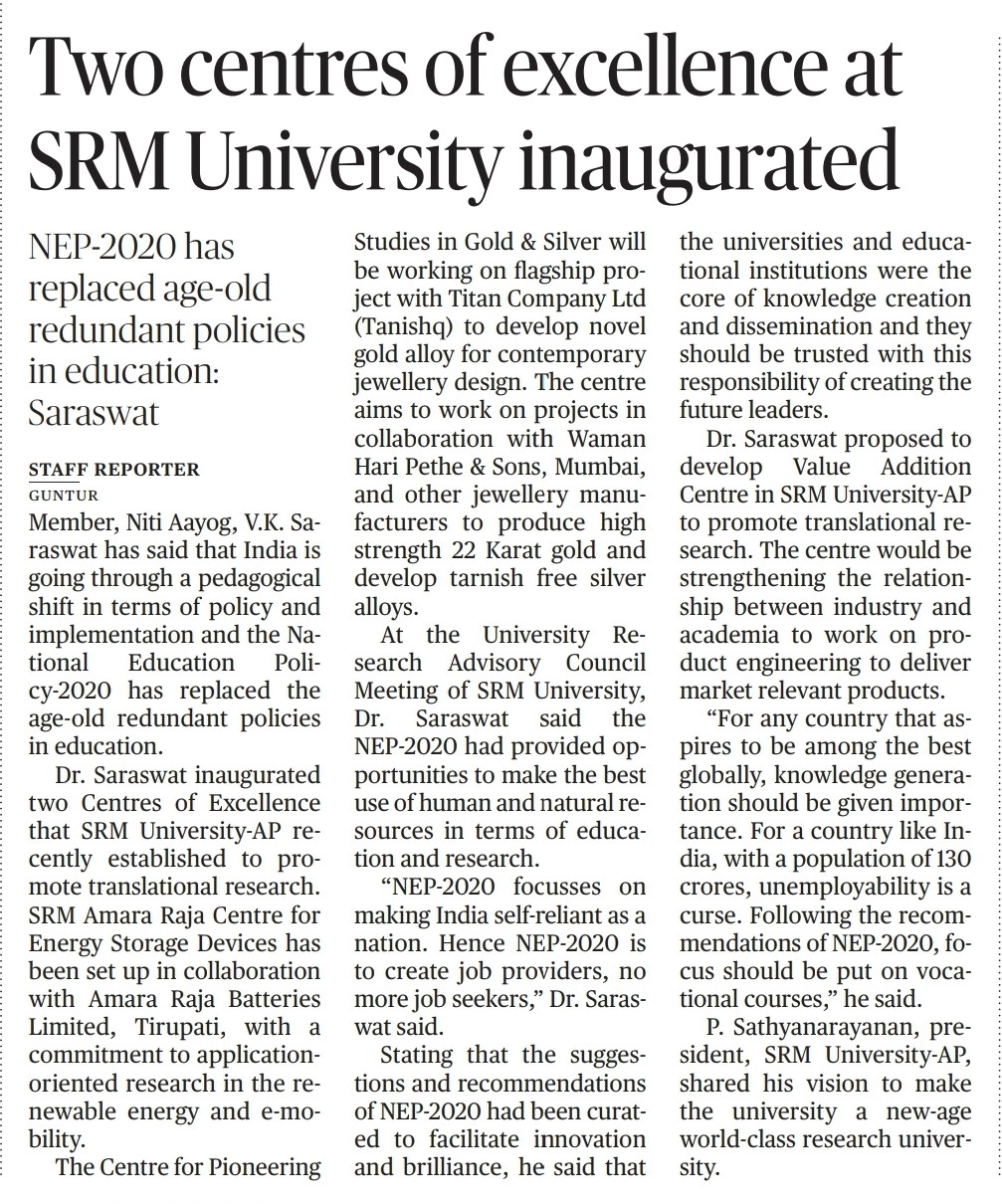
New Indian Express – Nov 09
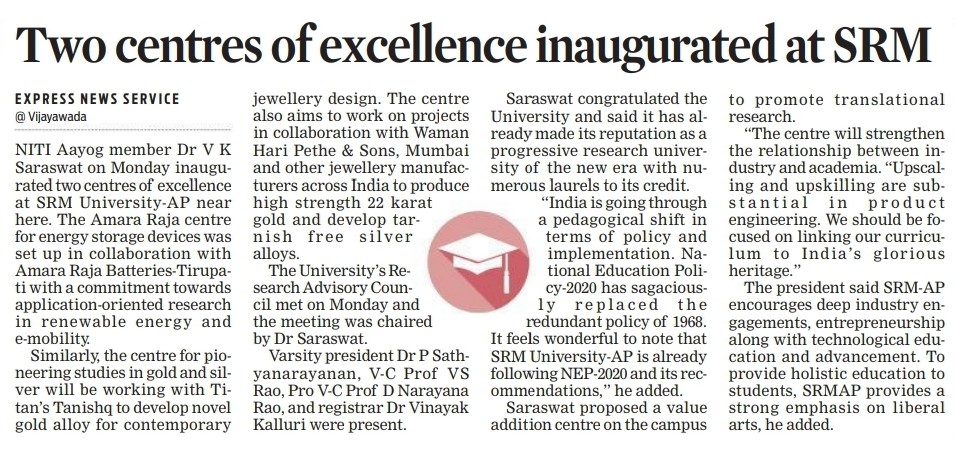
The Hawk – Nov 09
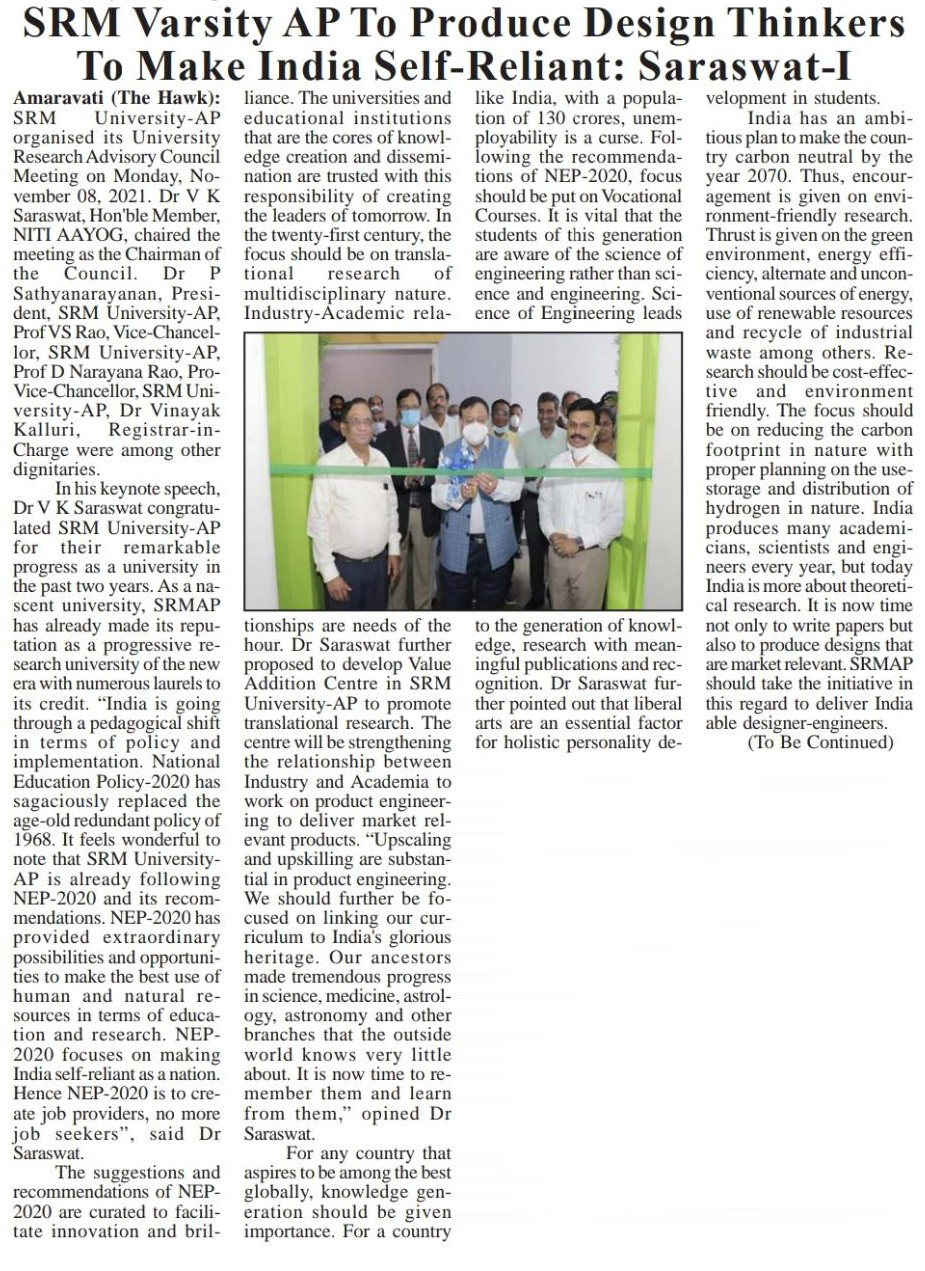
Andhra Prabha – Nov 09
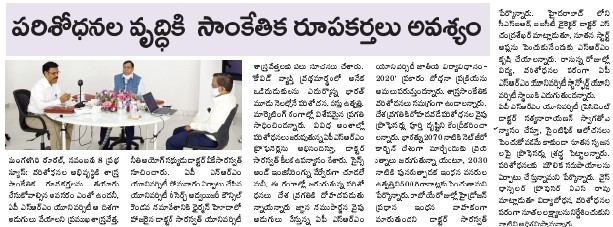
Eenadu – Nov 09
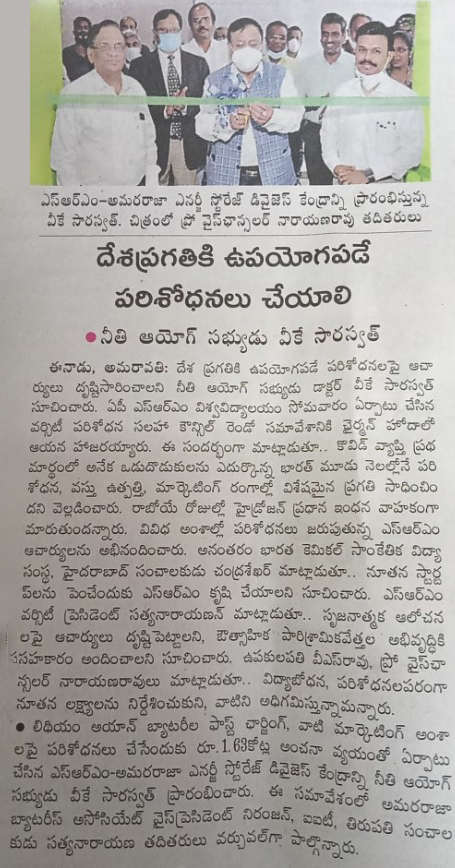
Praja Sakthi – Nov 09
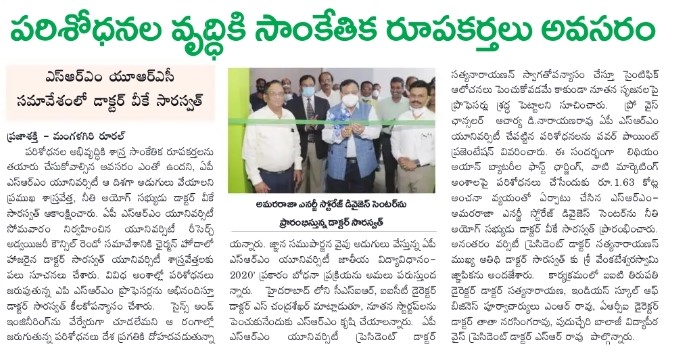
Sakshi – Nov 09
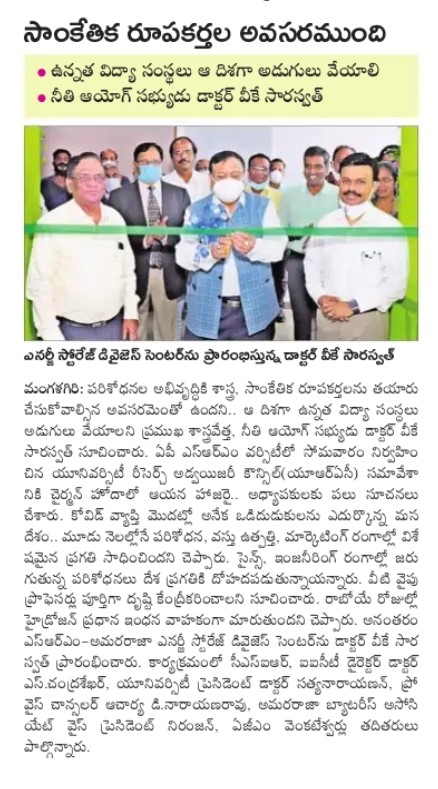
Surya – Nov 09
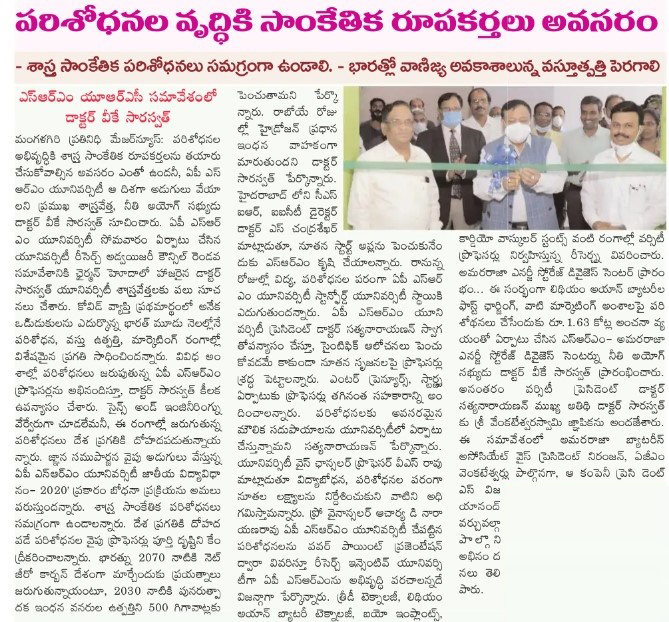
Vaartha – Nov 09
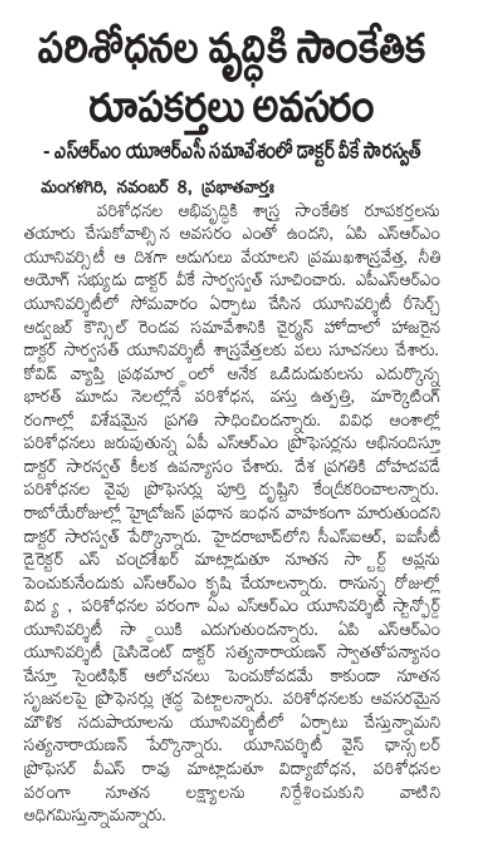
Visalaandhra – Nov 09
Continue reading →
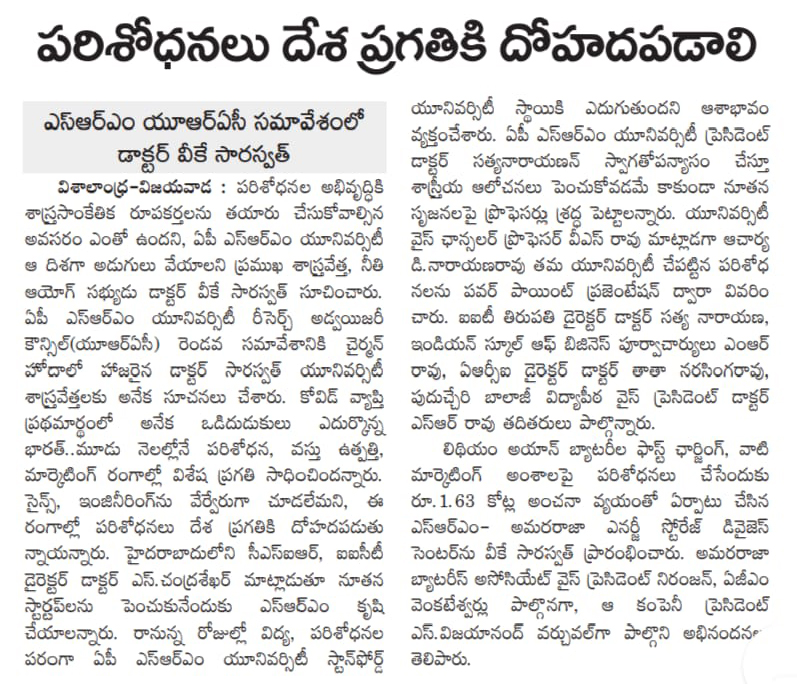
- STIP 2020: “Impartial inclusion will make India global scientific superpower” November 9, 2021
Deccan Chronicle – Oct 31
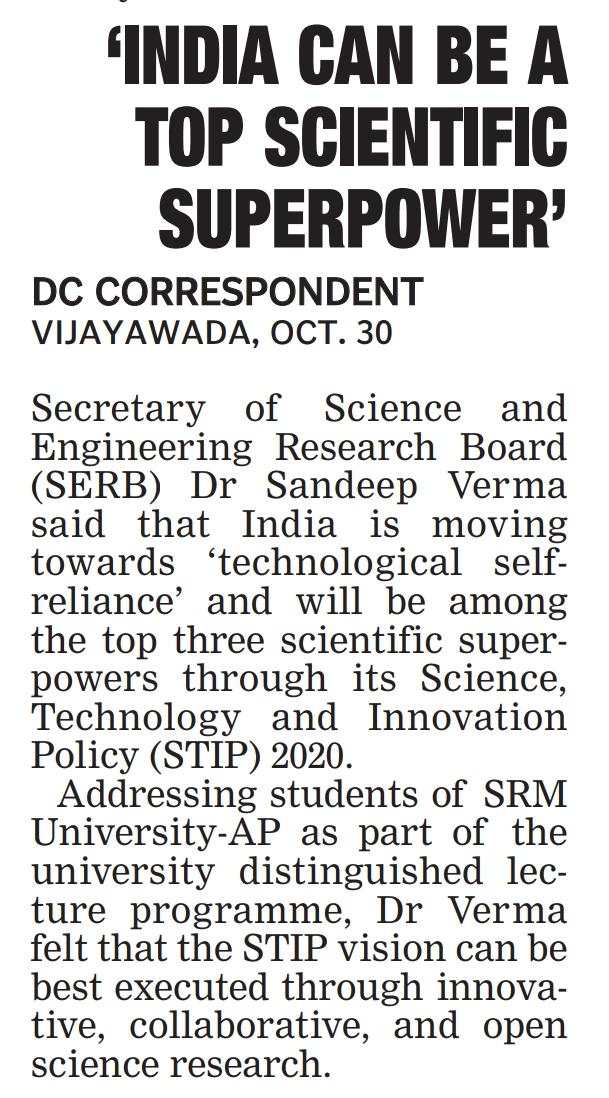
Daily Pioneer – Oct 31

The Hawk – Oct 31
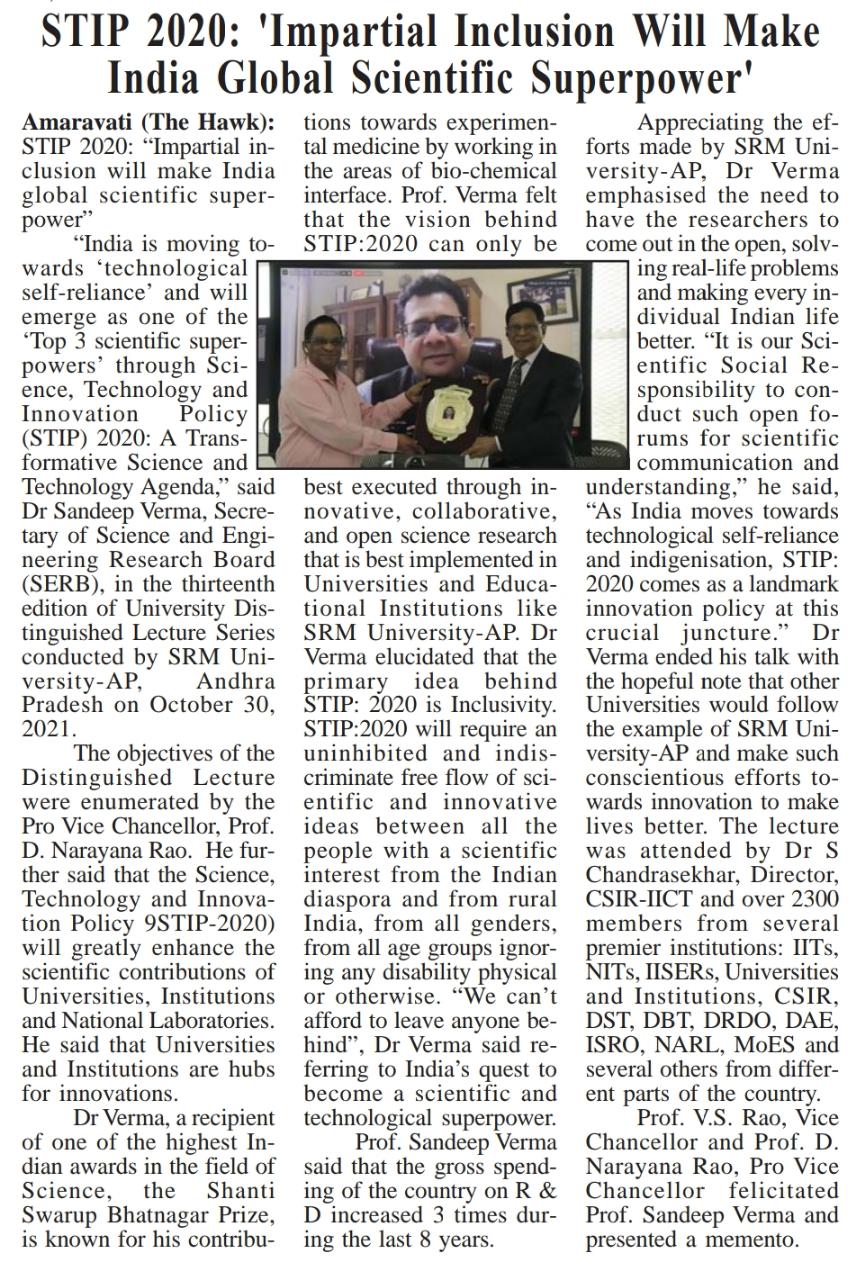
Andhra Prabha – Oct 31
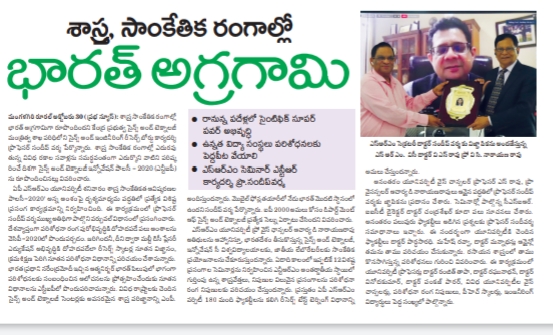
Eenadu – Oct 31
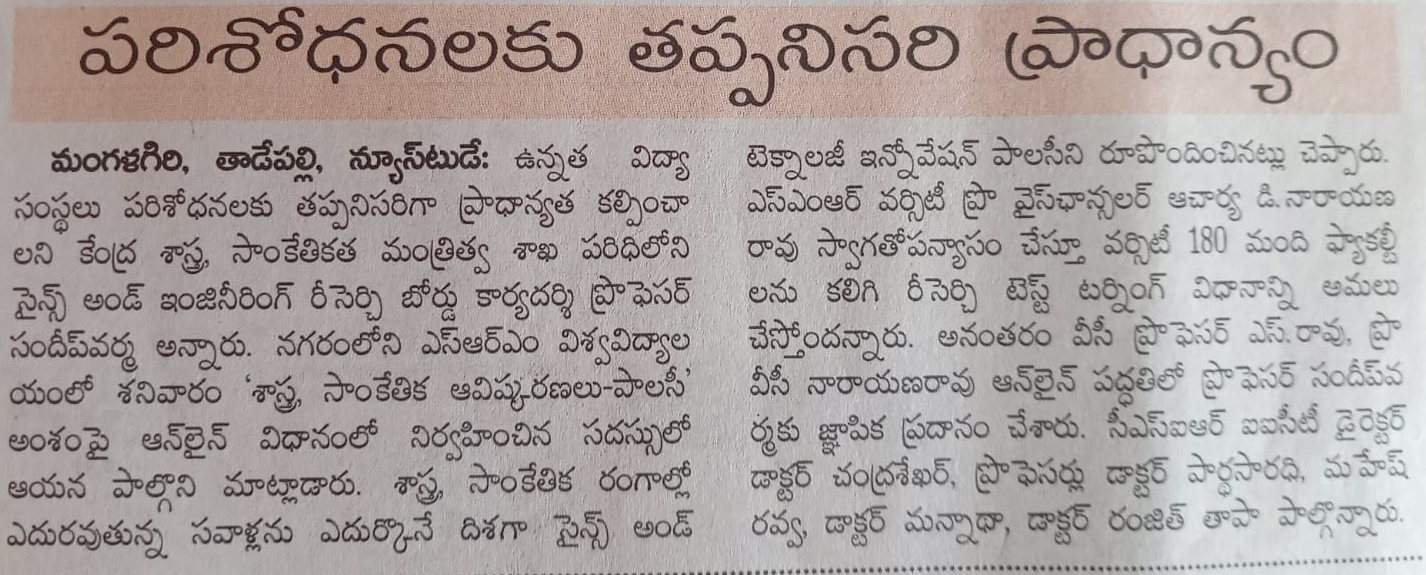
Praja Sakthi – Oct 31
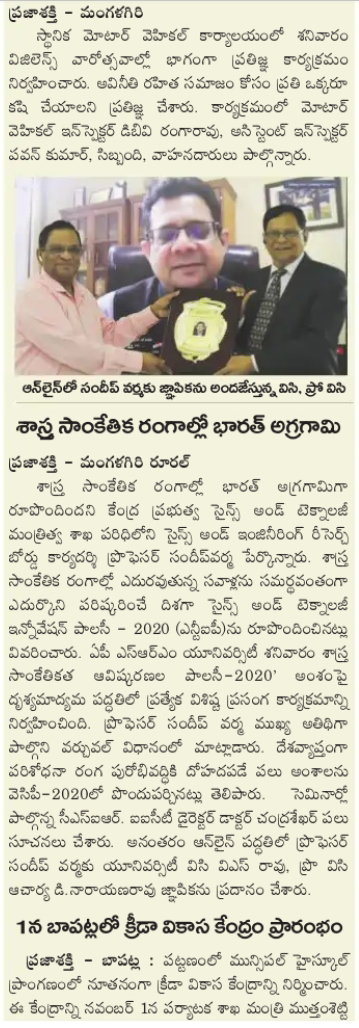
Surya – Oct 31
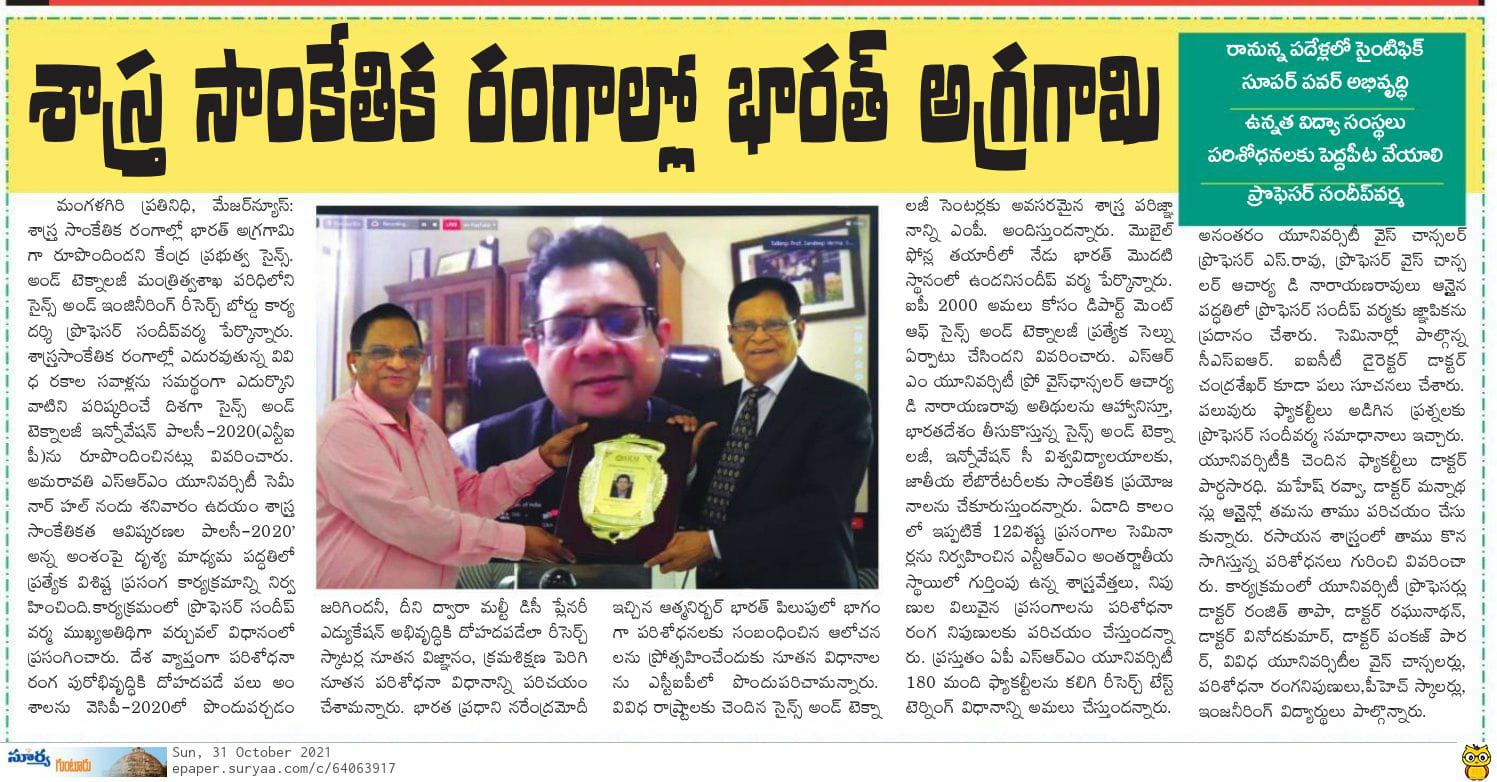
Vartha – Oct 31
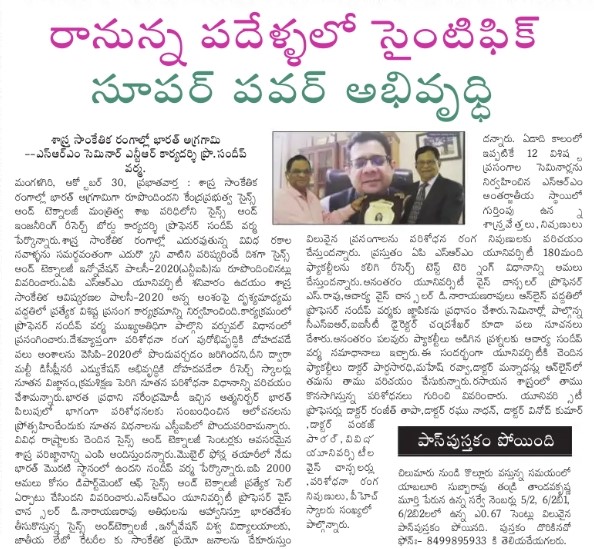
Vartha Prapancham – Oct 31
Continue reading →
